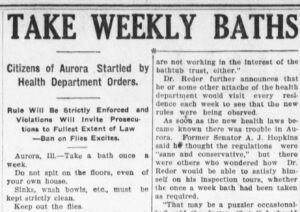Take Weekly Baths. That was the headline in Aurora, Illinois, in September 1910 and that made me think about bathing practices years ago.
We don’t think twice about taking a daily bath or shower these days. We take hot running water for granted and have nice, luxurious, bathtubs and showers.
But bathing years ago was a whole lot of work. There was no running water and no bathtub, as we know a bathtub today, positioned in a designated area.
Instead, for bathing, most people used a round metal wash tub that held several gallons of water. That same tub may have been used to wash clothing during the week. For both purposes the water had to be drawn from the well, brought into the house, heated on the stove, then poured into the tub. Because of this, baths were often taken in the kitchen so a person would not have to carry the hot water very far. Afterward, the bath water had to be ladled back into buckets and carried away.

Grandma multi-tasking while child bathes.
Saturday night was often bath night. Family members usually bathed one at a time in the same water. I have read the usual bathing order was father, mother, then children, from oldest to youngest. I think a bathing order by dirtiness makes more sense. I would push for the cleanest to bathe first and the dirtiest to go last. That’s just me.
Hair was shampooed during bath time and was lathered up and then rinsed by pouring water over the head. Clean clothes were worn after the bath.
Of course children fit in the wash tub better than the adults.

Bathing outside in a small tub.
Some homes had a full-sized tub for adults, which folded up against the wall, like a Murphy Bed.
Baths could also have been taken at a bath house or barber shop, but I am not sure how common that was in rural areas.
Adults may not have taken a daily bath, but they usually washed themselves down regularly, using a wash basin or bowl.
Times have certainly changed. Today most homes have more than one bathroom and bathing is a whole lot easier and convenient. And more private!
I found the following 1910 newspaper article while browsing through issues of the Celina Democrat. Note that the article pertains to Aurora, Illinois, not to Mercer County, Ohio. Good, practical advice, perhaps enacted incorrectly. Here are some highlights from the 1910 article:

Celina Democrat, 10 September 1910
TAKE WEEKLY BATHS
Citizens of Aurora Startled by Health Department Orders. Rule Will Be Strictly Enforced and Violations Will Invite Prosecutions to Fullest Extent of Law—Ban on Flies Excites.
Take a bath once a week.
Do not spit on the floors, even of your own house.
Sinks, wash bowls, etc., must be kept strictly clean.
Keep out the flies.
Sweep the floors thoroughly each day and scrub them at least once each week.
No more than 2 persons may sleep in a small room and not more than 5 in a room of moderate size.
All rooms, especially sleeping rooms, must be kept clean and well ventilated.
Windows must be kept open in all bedrooms.
Bed clothing must be thoroughly aired at least once a week.
Yards must be kept free from disease breeding rubbish and refuse.
Place garbage in regulation cans and set them out on day of collection.
….rules will be strictly enforced and violations will invite prosecution to the fullest extent of the law… From their police chief: “Those rules go…every one must take his bath and do the rest of the stunts. And I want to say right now that we are not working in the interest of the bathtub trust, either.”
…[a health officer] would visit every residence each week to see that the new rules were being observed…
…As soon as the new health laws became known there was trouble in Aurora. Former Senator A.J. Hopkins said he thought the regulations were sane and conservative but there were others who wondered how Dr. Reder [their health officer] would be able to satisfy himself on his inspection tours, whether the once a week bath had been taken as required…
Ok. Let’s stop right here. Some of this makes me uncomfortable, although I also wonder how Dr. Reder planned to verify that a weekly bath was taken. A time-consuming task, without a doubt. But Dr. Reder has that all worked out. Read on:
[Dr. Reder, commenting about verifying whether a person took their weekly bath or not]: …but if I should hale the wrong man, woman or child into court, wouldn’t it be a matter of evidence? The wise ones will have their alibis—I mean they will be able to show that they took their dip or soak or whatever the variety was. Proof will lie with members of the family, you know, or receipts at the barber shop…
…Every portable bathtub in Aurora was bought up within an hour after the proclamation. Dealers in plumbing supplies all sent in rush orders for bathroom equipment and hot water attachments for kitchen stoves. The towel department of the dry goods stores did a rushing business…
…Next to the bathing regulations, the ban on flies most excited Auroraites…Dr Reder did not intend to be unreasonable but wouldn’t say how many flies to the cubic yard would be allowed without a penalty…However, less blue bottle flies than of the ordinary or garden variety will be permitted. He suggested that parents offer rewards of say five cents a hundred to stimulate the activity of their children with wadded newspapers. (Celina Democrat, 10 September 1910)
They evidently had a fly plague of Biblical proportions if they were counting flies by the cubic yard. Was Dr. Reder also counting flies? Was $.05/hundred a good price for swatted flies? I wonder how that fly business all worked out.
So, what in the world was going on in Aurora in September 1910 that brought about these health rules? They obviously had some serious health problems. This was about 8 years before the Spanish Flue epidemic, so it was not that. It was probably tuberculosis, which caused more deaths than any other infectious disease in the 1910s, killing one in every five hundred individuals in the U.S. in 1906.
By that time they had some knowledge that microorganisms caused many communicable diseases and the public health system was developing public health education programs. They needed to educate the public about sanitation control and that personal hygiene would help control contagious diseases such as tuberculosis.
This was the way Aurora’s Department of Health dealt with their health issue, but perhaps just educating the public would have achieved the desired results without being legally heavy-handed and without the threat of prosecution.
Sadly, I see some similarities to the government overreach we experienced during our most recent pandemic.
I wonder if Aurora’s cleanliness laws were ever enforced and if anyone was prosecuted for not bathing or for not swatting flies.
I think I’ll ponder that while taking a soaking bath.



4 comments
Skip to comment form
Interesting- thanks for sharing!
Author
You are welcome!
Good Heavens it seems so intuitive or logical to begin with. Still that was then…
Author
Good, practical health advice, but prosecutable? Thanks for writing!